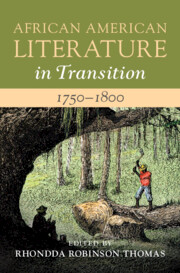Book contents
- African American Literature in Transition, 1750–1800
- African American Literature in Transition
- African American Literature in Transition, 1750–1800
- Copyright page
- Contents
- Contributors
- Preface
- Chronology
- Introduction
- Part I Limits and Liberties of Early Black Print Culture
- Part II Black Writing and Revolution
- Chapter 4 Anglo-Africans Writing Themselves into History during the Age of Revolution
- Chapter 5 Joining the Revolution
- Chapter 6 Black Literary Engagement with the Haitian Revolution
- Part III Early African American Life in Literature
- Part IV Evolutions of Early Black Literature
- Index
Chapter 6 - Black Literary Engagement with the Haitian Revolution
from Part II - Black Writing and Revolution
Published online by Cambridge University Press: 01 April 2022
- African American Literature in Transition, 1750–1800
- African American Literature in Transition
- African American Literature in Transition, 1750–1800
- Copyright page
- Contents
- Contributors
- Preface
- Chronology
- Introduction
- Part I Limits and Liberties of Early Black Print Culture
- Part II Black Writing and Revolution
- Chapter 4 Anglo-Africans Writing Themselves into History during the Age of Revolution
- Chapter 5 Joining the Revolution
- Chapter 6 Black Literary Engagement with the Haitian Revolution
- Part III Early African American Life in Literature
- Part IV Evolutions of Early Black Literature
- Index
Summary
The Haitian Revolution (1789–1804) in Saint-Domingue (later Haiti) and the African Protestant movement in the early United States coincided to produce a collective of protest literature by Black authors against the unequal treatment and inhumane bondage of Black people. Black Atlantic revolutionary literature offers a countervailing narrative to a historiography of the Haitian Revolution based on analysis from contemporary literary works by white writers. This repertoire of Black literature presents the history of expanding political and social freedoms across the Atlantic world. Black writers constructed disparate revolutionary views of freedom. In Saint-Domingue, Toussaint Louverture and Jean-Jacques Dessalines pursued different policies, and Julien Raimond advocated predominantly for enfranchisement of gens du couleur, free persons with African and European parentage. African American clergy Lemuel Haynes, Absalom Jones, and Richard Allen looked to Christian Republicanism to end slavery, while Freemason leader Prince Hall embraced revolutionary violence as legitimate to secure Black liberation. The geopolitical triumphs of the Haitian Revolution inspired transitions in Black Atlantic literature toward resistance writing throughout the nineteenth century. The revolutionary-era collective established a literary foundation upon which later Haitian and Black American authors published works heralding the birth of an independent Black republic in the Caribbean.
Keywords
- Type
- Chapter
- Information
- African American Literature in Transition, 1750–1800 , pp. 148 - 178Publisher: Cambridge University PressPrint publication year: 2022



